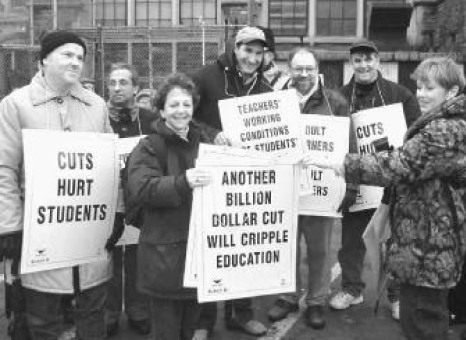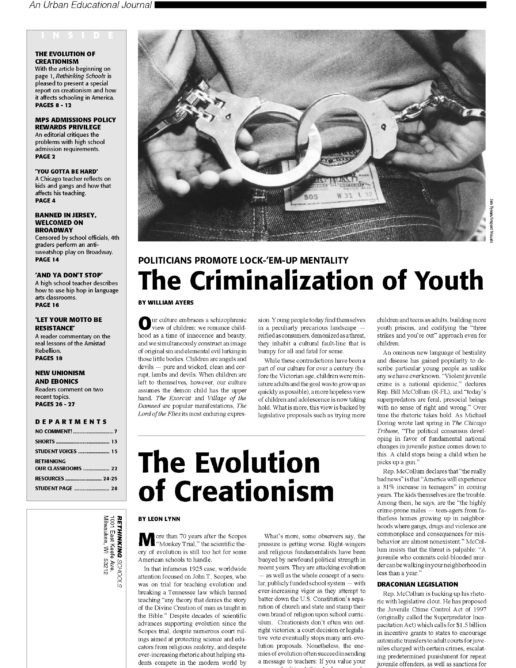Canadian Teachers Strike
More than 125,000 walk out over conservative legilsation

Teachers turned the streets of Ontario into a giant classroom for two weeks recently. From Oct. 27 to Nov. 10, 126,000 elementary and secondary school teachers walked off the job and closed schools for 2.1 million students across the Canadian province.
The protest was Canada’s largest teacher walkout ever. It focused on demands to withdraw Bill 160, misnamed the Education Quality Improvement Act, that was before the Ontario provincial legislature. Teachers argued that, among other things, the bill would have gutted local control of schools and centralized power in the provincial government, in preparation for millions of dollars of cuts in education spending. The bill would have also increased teacher workload and, according to union officials, would have led to the layoff of more than 10% of high school teachers. The bill was sponsored by Ontario’s Progressive Conservative (Tory) government, whose right-wing policies have promoted privatization and cutting of social services in order to reduce taxes.
Bill 160 was introduced in September. Some parliament members find themselves between a rock and a hard place. If they vote for Bill 160, they’re risking criticism from local voters; at the same time, party discipline requires they vote “yes.” While the large Tory majority means the bill will likely pass, court challenges are planned. At Rethinking Schools press time in late November, the bill was expected to pass within days.
Bill 160 strikes at the heart of a long-standing Canadian tradition: local control over education. If the legislation passes, issues such as school taxes, class size, instructional time, teacher qualifications, professional activity possibilities, out-of-classroom positions, and non-teaching duties could be regulated by the province.
What’s behind the power grab, teachers believe, is money. In Ontario (except Toronto, Canada’s largest city, and Ottawa, Canada’s capital), provincial grants add significant funds to local school taxes. Ontario, which stretches from Minnesota almost to the New York/Vermont border and north along Hudson Bay’s coast, is Canada’s largest province. In recent years, the provincial government has cut education spending so that Ontario now ranks 49th of the 63 states, provinces and other jurisdictions in the United States and Canada in terms of per-pupil spending. Opponents argue that the Tory majority plans to cut taxes by further cutting education spending. Since the Tories won the June, 1995 election, they have cut $500 million from the province’s education budget. According to Ontario Premier Mike Harris, a further
$700 million must go. The Tories claim they’ve increased education spending in Ontario; what they’ve done is change the way totals are calculated by including the province’s required contributions to teacher pensions.
The walkout was not technically a strike because it was not directed at teachers’ employers — the local boards of education — but at the provincial government. Teachers considered the job action an exercise of their democratic right to political protest, while their opponents called it an “illegal strike.” Although Ontario’s attorney general applied for an injunction to end the strike, the courts dismissed the request. In a ruling Nov. 4, Justice James MacPherson ruled, “The teachers have never engaged in a province-wide strike.
They are typically law-abiding people, they are deeply committed to the education of their students and they have behaved in an entirely peaceful fashion … they believe this strike is lawful, … When they point to serious problems in Bill 160, they say they do so in the public interest.” MacPherson advised that legal responsibility for ending the strike rested with the local school boards, through the Ontario Labour Relations Act. The issue was made moot when teachers voluntarily returned to work on Nov. 10. Thus far, teachers’ pay is being docked for work time lost, but disciplinary action has not been taken.
Throughout their protest, teachers received significant public support. Honks, cheers, waves, and thumbs-ups greeted most picketers. Teachers’ federations
throughout Canada sent messages of support, as did many labor leaders and community groups. Meanwhile, the parent group People for Education has started an “apple-green” ribbon campaign to encourage teachers and to protest the bill. Two Toronto-area polls are indicative of public response to the bill. City TV found those who “blamed the government” for the walkout outnumbered those who “blamed teachers’ unions” almost four to one. The Angus Reid group polled parents and found that 59% supported the teachers.

